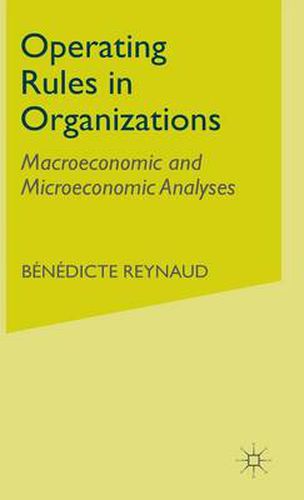Readings Newsletter
Become a Readings Member to make your shopping experience even easier.
Sign in or sign up for free!
You’re not far away from qualifying for FREE standard shipping within Australia
You’ve qualified for FREE standard shipping within Australia
The cart is loading…






This title is printed to order. This book may have been self-published. If so, we cannot guarantee the quality of the content. In the main most books will have gone through the editing process however some may not. We therefore suggest that you be aware of this before ordering this book. If in doubt check either the author or publisher’s details as we are unable to accept any returns unless they are faulty. Please contact us if you have any questions.
When economists claim that rules are coordinating devices, they do not explain how those rules operate in the reality of organizational life. Rules do not indicate behaviour, since their most important characteristic is their remoteness from the solution. Thus, rules are merely frameworks for action requiring constant interpretation. This book is grounded in Wittgenstein’s understanding of rules as having significance only in the course of their application. It focuses on two kinds of rules - macroeconomic and microeconomic - through detailed case studies of wage indexation and labour productivity.
$9.00 standard shipping within Australia
FREE standard shipping within Australia for orders over $100.00
Express & International shipping calculated at checkout
This title is printed to order. This book may have been self-published. If so, we cannot guarantee the quality of the content. In the main most books will have gone through the editing process however some may not. We therefore suggest that you be aware of this before ordering this book. If in doubt check either the author or publisher’s details as we are unable to accept any returns unless they are faulty. Please contact us if you have any questions.
When economists claim that rules are coordinating devices, they do not explain how those rules operate in the reality of organizational life. Rules do not indicate behaviour, since their most important characteristic is their remoteness from the solution. Thus, rules are merely frameworks for action requiring constant interpretation. This book is grounded in Wittgenstein’s understanding of rules as having significance only in the course of their application. It focuses on two kinds of rules - macroeconomic and microeconomic - through detailed case studies of wage indexation and labour productivity.